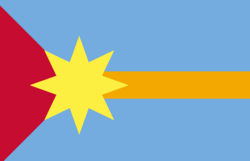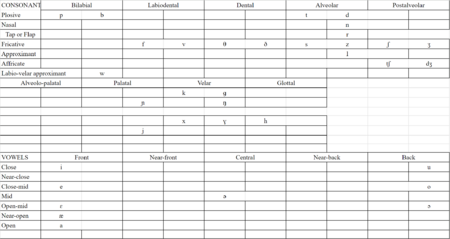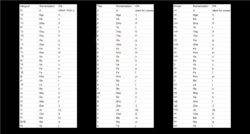Anchwa: Difference between revisions
No edit summary |
No edit summary |
||
| Line 1: | Line 1: | ||
{{Infobox language | {{Infobox language | ||
| name = Anchwa | |||
| boxsize = width of the infobox (default 5em) | | boxsize = width of the infobox (default 5em) | ||
| image = Anchwanese Flag.png | | image = Anchwanese Flag.png | ||
| caption = o.o | |||
| imagesize = 250px | | imagesize = 250px | ||
| imagecaption = Flag of the Anchwanese Republic | | imagecaption = Flag of the Anchwanese Republic | ||
| Line 35: | Line 35: | ||
| agency = Department of Anchwanese Language | | agency = Department of Anchwanese Language | ||
| clcr = NCW | | clcr = NCW | ||
}} | }} | ||
==Overview== | ==Overview== | ||
Anchwa is a language spoken in Southeast Asia and West Indochina. It is recognized as the National Language of the Republic of Anchwa. It has two forms, Old Anchwa (or Anchwa rae mai),and modern Anchwa (Anchwa khô mai)It is a historically tonal language that has since lost its tones. Some dialects in the north and east may still remain tonal. Anchwa has a surprisingly high amount of loans from Chinese, Korean, Japanese, and Arabic. Less surprisingly, it has loans from Vietnamese, Khmer and Thai. Malay and Indonesian words have trickled in, but mostly have stayed away from the northern dialects. Malay and Indonesian loans make up about 7% of the Central dialect's words, however, in the Peninsula's dialect, they make up almost 30 percent of the whole vocabulary. | Anchwa is a language spoken in Southeast Asia and West Indochina. It is recognized as the National Language of the Republic of Anchwa. It has two forms, Old Anchwa (or Anchwa rae mai),and modern Anchwa (Anchwa khô mai)It is a historically tonal language that has since lost its tones. Some dialects in the north and east may still remain tonal. Anchwa has a surprisingly high amount of loans from Chinese, Korean, Japanese, and Arabic. Less surprisingly, it has loans from Vietnamese, Khmer and Thai. Malay and Indonesian words have trickled in, but mostly have stayed away from the northern dialects. Malay and Indonesian loans make up about 7% of the Central dialect's words, however, in the Peninsula's dialect, they make up almost 30 percent of the whole vocabulary. | ||
==Phonology== | |||
Anchwa's Phonology is quite simple. Possibly the strangest additions are the dental fricatives, which are not found anywhere else in their region. | |||
[[File:Anchwa phonology.png|450px]] | |||
==Scripts== | |||
Anchwa is traditionally written with the Thai or Khmer Scripts, however, 200 years ago, a reform was made to completely switch to the Korean Script for standardization. For aspirated consonants, an acute apostrophe is added before: '타, for example is "tha". To represent the sounds not present in Hangeul (f, v, dental fricatives, x, gh, and ng), you simply add a grave aporstophe: `다 is the voiced dental fricative, ð. The word for music is nhathei, written as 냐`데이. The Thai script, however, has its own letters for aspirated consonants. What was the low tone mark is the letter used to denote orthography extensions. (like thô thung with the mark turning into θ)And finally, in the Khmer Script, these additions are written with the period: ។. | |||
[[File:Anchwa guide for orthography and romanisation.png|250px]] | |||
Revision as of 23:47, 13 March 2024
| Anchwa | |
|---|---|
 Flag of the Anchwanese Republic | |
| Pronunciation | [anʧwa] |
| Created by | camrionr_ |
| Date | 2023 |
| Setting | Alternate Version of Earth |
| Native to | Anchwan Nation (Thailand, Cambodia and most of the Malay peninsula) |
| Ethnicity | Thai people |
| Native speakers | Around 100 million (2024) |
Austro-Asiatic
| |
Early forms | Proto-Austro-Asiatic
|
Standard form | Central Anchwa |
Dialects |
|
|
| |
| Official status | |
Official language in | Republic of Anchwa |
Recognised minority language in | Laos, Vietnam, Myanmar |
| Regulated by | Department of Anchwanese Language |
| Language codes | |
| CLCR | NCW |
Overview
Anchwa is a language spoken in Southeast Asia and West Indochina. It is recognized as the National Language of the Republic of Anchwa. It has two forms, Old Anchwa (or Anchwa rae mai),and modern Anchwa (Anchwa khô mai)It is a historically tonal language that has since lost its tones. Some dialects in the north and east may still remain tonal. Anchwa has a surprisingly high amount of loans from Chinese, Korean, Japanese, and Arabic. Less surprisingly, it has loans from Vietnamese, Khmer and Thai. Malay and Indonesian words have trickled in, but mostly have stayed away from the northern dialects. Malay and Indonesian loans make up about 7% of the Central dialect's words, however, in the Peninsula's dialect, they make up almost 30 percent of the whole vocabulary.
Phonology
Anchwa's Phonology is quite simple. Possibly the strangest additions are the dental fricatives, which are not found anywhere else in their region.
Scripts
Anchwa is traditionally written with the Thai or Khmer Scripts, however, 200 years ago, a reform was made to completely switch to the Korean Script for standardization. For aspirated consonants, an acute apostrophe is added before: '타, for example is "tha". To represent the sounds not present in Hangeul (f, v, dental fricatives, x, gh, and ng), you simply add a grave aporstophe: `다 is the voiced dental fricative, ð. The word for music is nhathei, written as 냐`데이. The Thai script, however, has its own letters for aspirated consonants. What was the low tone mark is the letter used to denote orthography extensions. (like thô thung with the mark turning into θ)And finally, in the Khmer Script, these additions are written with the period: ។.

